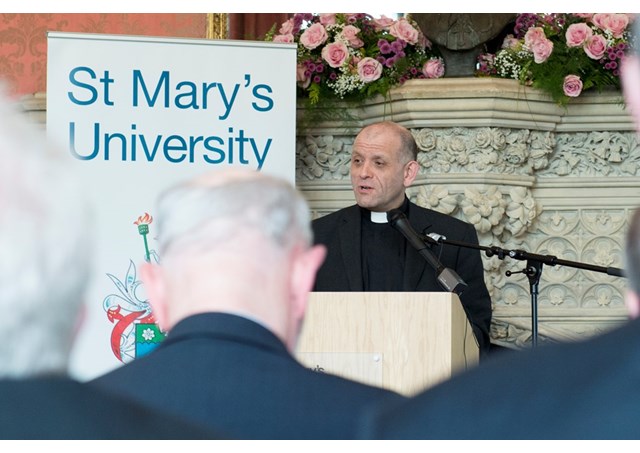
Education Undersecretary: freedom to seek truth together

(Vatican Radio) Religious liberty – what it means, who has it, and where it begins and ends – is fast becoming the central focus of a broad public rethinking of the role of religion in public life in Western societies, and indeed anywhere the influence of the Western civilizational project has been felt.
The Undersecretary of the Congregation for Catholic Education, Fr. Friedrich Bechina, FSO, recently delivered remarks at the official opening of the Benedict XVI Centre for Religion and Society at St. Mary’s University Twickenham, London, in which he argued that Catholic institutions of higher learning are privileged loci of that sometimes contentious public conversation, and are uniquely placed to prove the indispensable role religion has in society, precisely by playing it according to the peculiar identity and mission of the Catholic university.
Click below to hear Vatican Radio's extended conversation with Fr. Friedrich Bechina, FSO, Undersecretary of the Congregation for Catholic Education
“There is a most interesting development: on the one hand, religious freedom is not any longer granted,” as robustly as it once was to both individuals (though an individual’s freedom of belief is still protected) and to religious institutions in many legislative frameworks, Fr. Bechina told Vatican Radio in an exclusive interview following the Benedict XVI Centre’s launch ceremony on Thursday, May 5th, “and there is a kind of decline of corporate religious freedom.” Fr. Bechina went on to say, “On the other hand, we have seen in the last twenty years a strengthening of the academic freedom of higher education institutions,” adding, “there is an interesting phenomenon: that a Catholic university, with a clear Catholic profile, probably has a better legal basis for expressing the faith, because [such institutions] do not come with just doctrine, but with something that is proved in dialogue – that is proved in a serious and intellectually honest pursuit of truth.”
The Undersecretary of the Congregation for Catholic Education went on to say, “Truth, as well as faith, cannot be without freedom – and this is a key [idea in the work of] Joseph Ratzinger and then Pope Beneedict XVI,” he said, “that we do not have to have fear of truth, and that truth can only be found in this kind of freedom, and so the university can become the place – the ‘safe place’ of the Church – to develop its mission in an intellectually honest way and in dialogue with other opinions.”
Fr. Bechina praised the work of St. Mary’s and the Benedict XVI Centre in fostering just such an engagement. “I think it significant that such a research centre, which also is focusing within a university on questions of religion and society, should be named after [Benedict XVI],” who is, “an eminent academic,” who throughout his carreer has been able to dialogue, “not because he had just soft opinions on many things, but he had very clear opinions – opinions which one may accept or oppose, but with which one can engage – and there is no progress in dialogue, no progress toward truth– no intellectual progress, if we do not have clear standpoints,” from which we engage each other in dialogue.
| All the contents on this site are copyrighted ©. |


